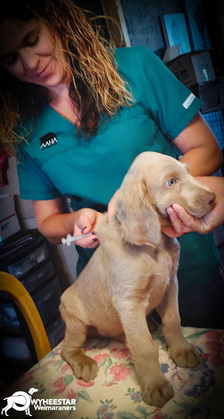The Vaccine Protocol
|
edWho doesn't want to be able to walk into the Veterinary office, and feel they can unequivocally trust them to make the right choice for our beloved Weimaraner?
The truth is there are varied philosophies and protocols. There are few practices, which see all that many Weims; even when they have several, their practice is a broad-based practice. Without exception the protocol is the same across-the board for the puppies; and adult canines. An excellent vet may not consider the Weimaraner vaccine protocol appropriate —or adequate. This heat-discussion over protecting our pets is nothing new. We love our critters and keeping them safe is a passion for the owner, breeder, and the professional caregiver (at every level). Regardless, the professional's approach vaccinations is going to be affected by academic study and experience. Therefore, even among professionals, there is dissension. Most quality Vet practices try to fall into the current practice category for a lot of reasons--including liability. That brings us to the OwyheeStar Vaccine Protocol recommendations and outcomes. People who reported back after having followed the protocol give favorable results. Also without exception, those opting for the vaccine titer test (in lieu of the sixteen-week puppy shot) report very high titer scores. These results mean the puppy did not need to get a sixteen-week vaccination; the risks is not worth the taking. There is no benefit so to speak. Risk?Why worry about the sixteen-week puppy shot? Does it matter? Why make it an issue and upset the Vet? Consider the fact that about 5-8% of Weimaraner pups have a vaccine reaction. The vaccine challenges the immune system and this means for certain Weims the reaction may trigger a violent vaccine reaction. This requires immediate treatment and in some cases can lead to ongoing health issues such as auto-immune problems of _Hypertrophic Osteodystrophy (HOD). At best it is expensive to treat and painful for the Weimaraner. At worst, the on-going issues lead to a terrible loss. Some severe vaccine reactions have been reported as severe enough to be lethal. OwyheeStar feels the best approach is to avoid having this sort of an encounter. It is somewhat interesting that the pup who had no problem with the earlier vaccination, suddenly has an unpredictable and violent reaction to the sixteen-week shot. As you can understand, the vaccine titer test result which indicates there is adequate protection (at sixteen weeks of age), is the preferred outcome. This cuts the risk factor to zero. In fact, foregoing the vaccine may well enhance the pup’s health. Please also note the Weimaraner can as well have a vaccine reaction to Lepto, Lyme and Bordetella vaccine. These (non-core vaccines) should never be given with the puppy shot. The Weimaraner Club of America's recommendation is to wait until the core vaccine protocol is completed before doing any of these add-on vaccinations—spacing them at least two weeks apart.
Note To Weimlover!
We realize you probably find this all very confusing. It would be so much easier not to have ever to worry about the vaccine, etc. Nonetheless, you want to do what is best for the fur family member. We recommend you find a caring and Holistic Veterinary Practice. Remember to do the important things--like our beloved Dr. Calhoun says, "I like to vaccinate for the things that are necessary." There are a lot of vaccines that are not required. Getting them all may not be in your Weim's best interest. ~ Thank You for listening--Cliff & Shela |
The OwyheeStar Weimaraner Vaccine Protocol
Puppy Vaccine ClarificationThere is a great push by the Veterinary community (due to the recent rise of Lepto) to include Lepto in the puppy shot. The Weimaraner Club of America (as well as others who study this breed) recommend you wait to give the Lepto, etc. until the puppy shots are completed. The puppy shot should not include Lepto, or Corona. No other vaccine should be given in conjunction with the puppy shot. Waiting for the Lepto, Bordetta, and other vaccine until the pup is a little older is less risky. It takes more effort and costs a bit more to space the vaccine, but is worth it.
What is the DAPPv ? Canine Distemper, Adenovirus Type 1 (Hepatitis), Adenovirus Type 2 (Respiratory Disease), Parainfluenza, and Parvovirus (Click Here to read more about the vaccine we use. Remember the Puppy Shot should not contain the Lepto or Corona. New TrendsMany professionals have embraced the idea of less vaccine. Ultimately, what a person wants is protection with less risk. The vaccine works by challenging the immune system to develop antibodies that fight off the virus. For a very long time, it has been the standard to get an annually updated shot to protect against Parvo and a few other common viral concerns; however, recent research has fueled heated debate against adherents and those who are proponents of a more Holistic approach.
Please remember to follow the vaccine recommendations for your puppy. Then keep in mind more vaccine may not be required to ensure adequate protection. OwyheeStar suggests you error on the side of caution. Do your research. You have to be the gatekeeper in all matters concerning your pet. This approach is much the same for your medical needs. To be less informed means things may happen that you later regret. There is sufficient evidence that your pet doesn't need the annual vaccine. Recommendations for the AdultHere is a suggestion that makes sense to us:
Puppy Vaccine as per the OwyheeStar Recommendation (listed above)
The non-core vaccine needs to be accessed on the basis of risk vs. reward. The other than core vaccine should never be given at the same time as any other vaccine in our way of thinking. Ask yourself, why over challenge the immune system? Take the time and the effort to make that extra visit--at least two weeks later. OwyheeStar encourages you to check out these links!
|

